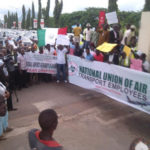
Experts who are into domestic and international freighting of goods and services have projected the logistics market in Nigeria to be about $60 billion annually with a lot of huge potential growth, if the country would harness agro produce opportunities at its behest.
Speaking during the Chinet Aviacargo Conference at Marriot Hotel in Lagos yesterday, CEO of Chisco Logistics Limited, Obinna Anyaegbu, said Nigeria has great opportunity to be the number one exporter of agro-produce in Africa because it has the most expansive land with fertile soil from the mangrove to the Sahel and temperate climate that enables the country to grow all kinds of crops for export and local consumption, if only the country is prepared to harness these opportunities.
Anyaegbu who disclosed that his company is into heavy duty haulage, which brings goods from different parts of the country for export through the ports and by air, said, “Chinese people want to eat our bananas, plantain and pineapples. We have one of the most nutritious fruits in the world but demand and supply are not meeting at the moment and that is why Chisco Express wants to bridge this gap.
“We have always made assets available for traders and this is what we have done for the last 40 years. But government and the regulatory bodies have to be involved. We have seen aviation investments go bad, so if we have to do this in the aviation sector, we want to ensure we do this correctly with the government parastatals and traders that have contracts for supply in Europe and other parts of the world.”
He explained that there are cargo planes and passenger bellies that go out of Nigeria empty but there are also rotten fruits in the farm, showing a huge gap to be addressed. And this is why Chisco Logistics is trying to consolidate and see how the company as a logistic solution could provide solutions in this regard.
“When you look at the GDP of the country, about 10 to 13 percent is from the Logistics sector because this is about commerce and production. We eat and drink everyday and things have to move around. We need to pay for logistics. Nigeria’s logistics market is about $60 billion market. If you say our GDP is $500 to $600 billion market, so 10 percent of this will amount to about $60 billion,” he explained.
He recalled that two years ago, Chisco Logistics leased an aircraft for cargo export but did not get cargoes to fill the aircraft.
“We have leased an airplane two years ago, doing Lagos-Accra when our vehicle service was down. Every single day, we move from Lagos to Accra with buses and trucks. But when COVID-19 hit, we leased an airplane but we had no goods to move. It was a 14 tonne Boing B737 airplane and we were struggling to get two tonnes in a week.
“We observed that the biggest player on the route was DHL and they are bringing about 70 to 80 tonnes of cargo into Nigeria and move it across West Africa. So it is mostly imported goods that are moving via the African routes. Kenya is taking out a lot and they have great supply contract. This is because they meet the international standards,” the CEO, Chisco Logistics said.
President Aircraft Owners and Pilots Association of Nigeria, Alex Nwuba, said there are comparative advantages as regards where cargo airports are built which presents opportunities for traders, farmers and airlines, noting that the Anambra cargo airport could be fully utilized to move agro-produce.
“Anambra has a strategy for producing agricultural products and vegetables for domestic and international markets. You can’t move this by road. The airport will be useful to achieving this. Anambra is a huge industrial and commerce based economy and some of these things that are produced within that economy and taken out of that economy will take advantage of that airport.
“There is a potential for tourism that exist in Yobe. In Calabar, there is potential for tourism. The state government is building a new airport at Obudu to bring you closer to that experience. We can take advantage of this. Airports are nothing more than real estate. There are opportunities. The logistics companies have said they have the trucks and means to move goods, the aviation sector said they have the airplanes,” Nwuba said.
He however remarked that a major challenge is the information gap that exist in the industry, adding that the Ministry of Commerce and Information aught to provide information on things that are being produced, where the market for those things are and the service providers.
“We are lacking the information on where things are and the market for those items. We need these market intelligence, so that service providers can take advantage of those opportunities,” Nwuba added.
The Managing Director, Cornerstone Insurance PLC, Ganiyu Musa, who spoke on the topic: ‘The Role of Insurance in Growing Aviation and Cargo Business in Nigeria,’ said the balance sheets of all insurance companies in Nigeria put together is roughly one billion dollars.
Musa said regulations does not allow insurance companies expose more than five per cent of their shareholders’ funds and this affects the amount of risks insurance companies can insure.
He said there are variables that affect pricing that are outside the control of insurance firms.
Speaking earlier, the Director, Policy and Regulation of National Insurance Commission, Leonard Akah said there is a need for more capital injection to enable more local retention, enhanced cooperation among aviation and insurance agencies, licensing of more local reinsurers, strict implementation of local content Act on insurance regarding off-shore placements and engagement of the Airline Operators of Nigeria, (AON).






